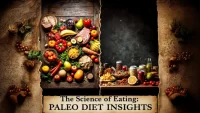“Breakfast is the most important meal of the day”—we’ve all heard it, but is it really true? Science says yes. Skipping breakfast doesn’t just leave you hungry; it affects your metabolism, focus, and even long-term health.
From stabilizing blood sugar to boosting brainpower, a well-balanced breakfast sets the tone for the entire day. Let’s explore why you should never skip it and how to make the most of your morning meal.
What Makes Breakfast So Important?
After hours of fasting overnight, your body needs fuel to kickstart metabolism, balance hormones, and sharpen mental clarity. Here’s what happens when you eat breakfast:
- Restores glycogen levels for energy
- Triggers fat-burning metabolism
- Improves concentration and memory
- Reduces cravings for unhealthy snacks later
The Science Behind Breakfast and Metabolism
Breakfast Jumpstarts Your Metabolism
Eating within an hour of waking up activates thermogenesis, the process where your body burns calories to digest food. Studies show that breakfast eaters have a higher resting metabolic rate than those who skip it.
Regulates Blood Sugar and Insulin Sensitivity
A nutritious breakfast prevents mid-morning crashes by stabilizing blood sugar. People who skip breakfast are at a higher risk of insulin resistance, which can lead to type 2 diabetes.
Supports Weight Management
Contrary to the myth that skipping breakfast helps with weight loss, research shows that breakfast eaters tend to:
- Consume fewer calories throughout the day
- Make healthier food choices
- Have lower BMI levels on average
How Breakfast Affects Brain Function
Boosts Cognitive Performance
Your brain runs on glucose. After an overnight fast, breakfast replenishes this fuel, improving:
- Memory recall
- Decision-making speed
- Focus and productivity
Enhances Mood and Reduces Stress
Skipping breakfast can lead to irritability and brain fog. A balanced meal with protein, healthy fats, and fiber supports serotonin production, keeping stress levels in check.
The Best Foods to Eat for Breakfast
Protein-Packed Options
- Eggs
- Greek yogurt
- Cottage cheese
- Lean turkey or chicken sausage
Healthy Fats for Sustained Energy
- Avocado
- Nuts and seeds
- Nut butter
- Chia seeds
Complex Carbs for Long-Lasting Fuel
- Oatmeal
- Whole-grain toast
- Quinoa
- Fresh fruit (berries, bananas, apples)
Foods to Avoid
- Sugary cereals
- Pastries and donuts
- Flavored yogurts (high in added sugar)
- Processed breakfast bars
Common Breakfast Myths Debunked
“Skipping Breakfast Helps with Weight Loss”
Studies show that people who skip breakfast often overeat later and choose less nutritious foods.
“Coffee Alone is Enough”
While caffeine provides a temporary boost, it doesn’t replace the nutrients your body needs after fasting.
“All Breakfast Foods Are Healthy”
Many “breakfast” foods (like muffins, sugary cereals, and juice) are loaded with empty calories.
Quick and Healthy Breakfast Ideas for Busy Mornings
Short on time? Try these 5-minute breakfasts:
- Overnight oats (prep the night before)
- Smoothie (spinach, banana, protein powder, almond milk)
- Avocado toast with a boiled egg
- Greek yogurt with berries and granola
What If You’re Not Hungry in the Morning?
If you struggle with morning appetite:
- Start small (a handful of nuts or a piece of fruit)
- Hydrate first (drink water to wake up digestion)
- Adjust dinner timing (eating too late can suppress morning hunger)
FAQs About Breakfast
Q: Is intermittent fasting bad if it means skipping breakfast?
A: It depends—some people thrive on delayed eating, but others experience energy crashes. Listen to your body.
Q: Can I just eat a protein bar for breakfast?
A: Many protein bars are high in sugar. Opt for whole foods when possible.
Q: What’s the best breakfast for weight loss?
A: A mix of protein, fiber, and healthy fats (e.g., eggs with veggies and avocado).
Q: Does breakfast timing matter?
A: Eating within 1-2 hours of waking optimizes metabolism and energy.
Q: Are smoothies a good breakfast replacement?
A: Yes, if they include protein, healthy fats, and fiber—not just fruit and juice.
Final Thoughts: Make Breakfast a Priority
Breakfast isn’t just about eating—it’s about fueling your body for success. Whether you prefer a quick smoothie or a hearty omelet, starting your day with nutrient-rich foods improves energy, focus, and long-term health.
Try this tomorrow: Swap sugary cereal for a protein-packed meal and notice the difference in your energy levels. Your body (and brain) will thank you!











